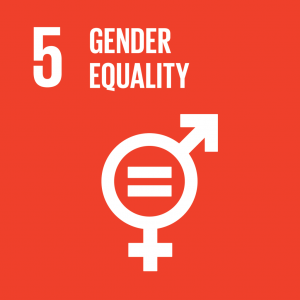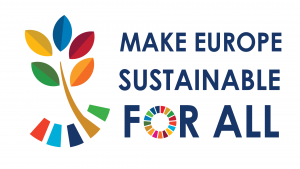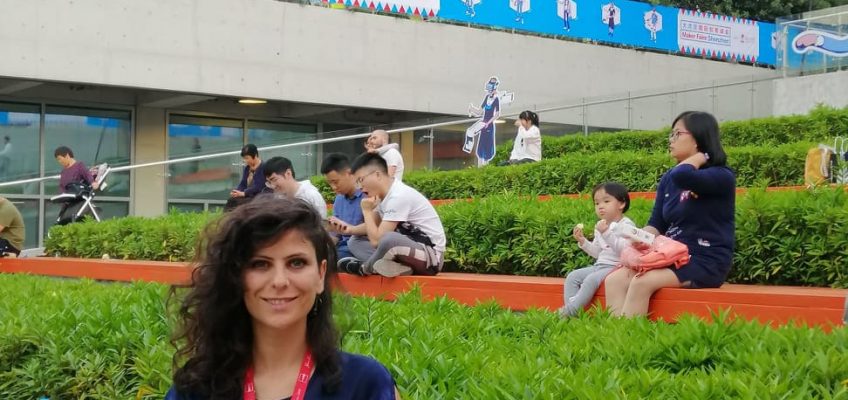Women in the both shores of the Mediterranean are facing inequality. In some countries gender-based discrimination is visible and present on a policy level. In other countries it is the glass ceiling that hinders women from active participation and development. We are also witnessing a reversed wave where proposals that are questioning women’s autonomy on their bodies are presented (World report, 2019). Gender equality is in the priorities of the EU foreign policy. The EU commission launched the strategic engagement for gender equality for the years 2016-2019. Part of this strategic frame work is dedicated to end gender-based violence. The Swedish Feminists Foreign policy was officially announced as the first Feminist Foreign policy in 2014. Among its priorities and goals is to combat gender and sexual based violence. Yet, gender-based violence is still a reality that affects women and people out of gender binarism in the both shores. Women in the south and north shores of the Mediterranean addressed several overlapping issues of discrimination that women are facing (Talani and Giusti, 2017). The EU approach toward gender equality in the southern countries is perceived as not tangible nor inclusive to the different realities (Ghosheh, 2019).
This policy brief delivers common struggles and opportunities for transnational cooperation between women’s rights activists in the Mediterranean. It delivers recommendations for the EU foreign policy to enhance inclusivity and intersectionality by supporting transnational grass-root activism, and inclusion of diaspora community for gender equality and to combat gender-based violence across the Mediterranean.
Concept validation of gender equality in the Mediterranean. An investment toward a transnational inclusive base.
Research is one of the four main Rs in the Swedish feminist foreign policy. The European Union adapted gender mainstreaming in its neighbourhood foreign policy (Guisti, 2017). The Swedish feminist foreign policy was initially announced from a top-down approach. Later on, the policy was developed with an inclusive approach by adding the fourth R which refers to different Realities. It supported international campaigns like #SheDecides. Yet to build an inclusive base that can reach wildly as a transnational grass root campaign we need to identify the common vision of gender equality beyond nations and borders. Foreign policies and international treaties are often previewed as an exterior on a local level, and when it comes to the concept of gender equality there is still ambiguity about its definition between different languages and cultures (Lamrabet, 2017). Using concept validation techniques is an effective tool to recreate a terminological expression in refence to gender equality. This is an inclusive and basic step to end gender-based violence while adapting the current definitions to be more inclusive and tangible to the different realities across the Mediterranean region.
Institutions like the Union For the Mediterranean and Euro-Med women Foundation are doing an important work to support advocacy for women’s rights and gender equality in the region. The Euro-Med women foundation is working with the civil society sector as the main influencer to stir up all other sectors. Yet, more support is needed for grass-root movements and activism beyond the institutions and organizations in the civil society sector. This is because of the restrictions on democracy and freedom of expression which affect women and people out of gender binarism more than it affects men (Human Dignity Trust, n.d.). Qualitative research proved that the marginalization of women is a cause to robust democracy (Fish, 2002, pp. 4–37). Yet, women’s rights can be used as a doubled edge weapon in non-democratic countries. For example, gender parity is an important tool to achieve gender equality. It is perceived as an important measure to combat gender-based violence by increasing female political representation to reform public policies. Yet, after the Arab spring countries like Jordan increased the quota for women but the same regime imposed further restrictions on cyber activism. Some researchers address cyber-activism as an important tool for women activism in different Arab countries due to cultural and social norms (C. Radsch, 2012). This was confirmed by Naima al Habashnah one of the known female grass-root activists to amend the nationality law in Jordan, and other female activists in the Southern Mediterranean region (F. Sweis 2015; Habashneh, 2013).
Thus, in this case the measures taken by the government can refer to the state as a Feminist state. Yet, the same state restricted cyber activism which will restrict female activism and leadership more than male activism and leadership. Therefore, it will contribute in gender inequalities. The national commission for women in Jordan was established by Princess Basma Bent Talal, the sister of the King and part of the royal family. Part of their programs is to give trainings for potential female leaders who might candidate for the parliamentary elections (The Jordanian National Commission for Women (JNCW), n.d.). In the same time, criticizing the royal family in Jordan is considered as a crime by law. Supporting grass root movements within an organizational structure in non-democratic countries can lead to the co-optation of these movements and losing the demands for a real change. UFM, organized transnational meetings to redefine the tools for research on gender and statistics, this event is organized on a ministerial level which is important as well as gender mainstreaming in research which is supported by the EU foreign policy and the Swedish Feminist foreign policy. Yet, more support is needed to establish a transnational grass-root campaigns to avoid negative co-optation of social movements where narratives and demands are shifted from the real change.
The second question for this section, is why to support transnational grass-root campaigns and not only national or local grass-root activism? In one hand, gender equality is miss-confused with female supremacy and hatred for men by different people in the both shores of the Mediterranean. Thus, to create the right environment for transnational grass root activism for gender equality in the region will assist the development of qualitative research methods and tools. It will contribute in building a common up-to-date concepts of a Mediterranean bottom up identity toward a common vision for gender equality. The transnational meetings organized by IEMED is an important space to seed this progress toward transnational activism in the Mediterranean. Yet, more support shall be invested further on the inclusivity and the sustainability to assure transforming these meetings from institutional transnational meetings to grass-root tangible campaigns of solidarity toward gender equality in the both shores.
On the other hand, international treaties for gender equality is perceived as a soft tool for coloniality by different people in the southern Mediterranean countries (Tahboub 2017a, 2011b; Al Saeedany, 2013). One of the critics from several researchers for the Swedish feminist foreign policy was based on the fear that such measurements can become soft tools for imperialism (McCurdy and Sefton, 2019). Thus, to reconceptualize gender equality by supporting a transnational grass-root validation is an important measure to clarify the core values of gender equality and to set it as a universal Mediterranean common struggle rather than a point of division between unequal and different worlds. Further, interculturalism is an essential part of transnationalism. A transnational campaign is less ethnocentric and more progressive.
Why a Feminist Foreign policy rather than a foreign policy for gender equality?
When Margot Wallstrom, first announced the Swedish Feminist foreign policy it was faced by sceptical concerns. There is an intersectional point between these concerns. Some of the concerns referred to the Swedish feminist foreign policy as non-realistic because it does not go in line with politics and benefits. Other concerns referred to the Swedish Feminist Foreign policy as a tool for soft imperialism and that it is neglecting the real needs of women and LGBTQ community for equality and justice. Soon enough Sweden put restrictions on arm export to Saudi Arabia and condemned the Israeli violation of Palestinians human rights as part of the Feminist Foreign Policy. This caused a diplomatic crisis, but it sent a clear message of solidarity that ending gender-based discrimination is not separable from human rights and global justice. The Swedish Feminist Foreign policy and the European strategic frame work for gender equality addressed gender mainstreaming as a main pillar and approach in their work. Sweden emphasised on intersectionality as well as the European commission for foreign affairs. France addressed Feminist diplomacy within its G7 summit. Yet, women’s rights and gender equality were hijacked previously under the frame of “embedded feminism” where the so called first world power used military interference using the gender equality card to economically exploit other nations (Nachtigall, 2014). Qualitative research shows that in crises and ware zones gender-based violence increases and it is more likely to hit strongly women and people out of gender binarism.
In qualitative studies young women from the both shores expressed their concerns in presenting themselves as feminists in fear of stigma. The Foreign policy for gender equality represents a valuable work and important efforts that are feminists by nature and impact. Yet, to announce an intersectional Feminist foreign policy is a wider umbrella that integrates and mainstream gender within a wider frame of intersectional Feminisms. Gender equality is representing a goal rather than a clear gender mainstreaming in full sectors including activism and political identities within the intersectional Feminist ideology. Destigmatizing feminism is an important step to reach a real change. This can be achieved through inclusion and accountability through bottom-up channels to evaluate and develop the existing policies.
Common goals with diverse strategies. Gender mainstreaming for interculturalism
Women in Spain and Italy took the streets to combat conservative proposals to restrict women’s autonomy on their bodies. They also took the streets to demand the implementation of policies that are meant to combat sexual and gender-based violence. Unfortunately, in practice there were many documented cases where women who are victims of domestic violence could not reach out for justice due to the lack of implementation of these policies. Women in Tunisia, Lebanon and Jordan celebrated the abolishment of marry your rapist law that excuses the rapists from any charges if they marry their victims. Women activists in Tunisia, celebrated new laws that criminalize martial rape and further laws to end gender-based violence in the work force.
The concept of gender and sex is one of the main elements in one’s culture. This concept might vary from one’s culture to another. Yet when we refer to cultures, we are not necessarily referring to different countries. Transnational grass root activism can be the bridge between different sub-cultures in different southern-northern Mediterranean countries to develop the Mediterranean identity starting from the concept of gender as a progressive channel toward development. #MeToo campaign for anti-sexual harassment was not perceived well in different countries in the south of the Mediterranean. Ending sexual and gender-based violence is a common struggle for women in the both shores of the Mediterranean. The problem is not in the goal it is in the strategy. Interculturalism starts from switching the question from what to why. This is how cultural mediation starts by building a bridge from what you are doing it to why you are doing it.
Ending violence is a common universal desire that our identities can be built on. Further, living between conservatism and openness is not a clash between civilisation as Huntington referred to. In the Mediterranean region, more investment is needed to build the narrative of “We”. The EU foreign policy can be a great valuable bridge rather than only an influencer or mentor. The Swedish Foreign Policy opened its embassies as a place for local activists to gather and create their own campaigns. Yet, transnational grass root campaigns beyond institutions will be the effective tool for real change out from institutional co-optation or being perceived as an exterior and a beneficiary of an exterior, Foreigner institutional aid or support.
The Diaspora community as an Agent for change
The recent waves of cultural mediation showed the potential use of migration as an agent for international development cooperation and mutual understanding between the south and north of the Mediterranean. Yet, the power of cultural mediation is not completely unleashed. Cultural mediation is depoliticised and used out of its full context. It is used only on a social level. Meanwhile, people who left their countries due to socio-political restrictions are a valuable ally for progressive change. The Diaspora community represent the channel and the knowledge of using the highest potential from the both shores to develop a common identity toward mutual development. State feminism in Tunisia was used before the Arab spring to depoliticize women’s rights activists. France was criticized by activists in Tunisia of tolerating the former dictator regime of Zain Al Abdeen due to mutual interests and benefits. In Egypt, after the military cope further restrictions on freedom of expression are imposed. Women’s rights association are either limited to social topics or limited and restricted totally.
In the recent demonstrations that took the streets in Cairo, it was the diaspora community that were able to take the streets and address the anti-military regime narratives without being subjugated to arrest and interrogation. Gender-based violence cannot be separated from politics and democratic values. The Swedish Feminist Foreign policy and the European approach toward gender equality are investing in supporting the democratic values and are investing in gender mainstreaming in all topics. Sweden has opened its embassies and offices worldwide to give support for local activists. The European Union support international events where local activists from the southern countries are expressing their cause and fight for gender equality and to end-gender based violence. But here comes the main question whether these narratives are going to imprison their presenter upon their arrival, and weather this potential risk will limit women’s rights activist not to address all the forms of violence and marginalization that women are experiencing in the southern countries. The engagement and inclusion of the diaspora community can be an effective measure to combat the depoliticization of women’s rights activists, and to address all the type of violence that are based on gender. As we have illustrated earlier in the Jordanian case, where increasing women political representation is accompanied with restriction on cyber activism which will likely affect women more than men.
Opportunities for grass-root transnational cooperation in the Mediterranean
The EU international programs like the European Aid is addressing the support for less developed countries rather than building a bridge of mutual growth and international development cooperation. In the Mediterranean region. Programs like the young Mediterranean voices is close to the civil societies. It is led and presented by young people from the both shores. Same goes for the young researchers’ meetings organized by IEMED. This environment is important for the targeted people, which in this case are the Mediterranean voices for progressiveness, to engage and build on a common path for gender equality in the region. The research field is an important field for cooperation. Yet two points shall be borne in mind: 1. Ethno-centric research can enhance orientalism. Women’s rights issue and gender equality will be perceived as a myth, and more precisely as an imperialistic tool as long as we are speaking about a developed and less developed world. 2. More qualitative research is needed on the similarities and potential cooperation between women’s rights movements in the south and north of the Mediterranean. There is a huge potential of cooperation specially when it comes to public policy making that includes the implementation of these policies. For example, in Jordan, Tunisia and Lebanon women’s rights activists are mobilized to reform public policies on a legislative level to stop gender-based violence, while in Italy and Spain women’s movements took the streets to ask for a full implementation of policies that already exist on a legislative level but not necessarily implemented in practice. There is a cross point for potential cooperation where a joint research on Mediterranean tools to prevent and combat gender-based violence is a valid outcome. Yet, for this path to be created it has to be a grass-root engagement. Grass-root movements present people to people engagement. The recent honour killing of Isra’a Al Gharib from Palestine by her family is an example on how people from all around the world felt into solidarity and condemnation of the horrible act. Yet, we often neglect that gender-based violence and victim blaming is not only a concern for the Southern countries but also for the northern ones. Like the recent disturbing event in the United Kingdom, where the lawyer of a rapist claimed that there was no rape as the victim was wearing a relieving lingerie as they claimed.
Recommendations for the EU foreign policy toward gender equality in the Mediterranean
- Opening channels for transnational grass-root movements to access support despite their belonging to an existing organization or not.
- Supporting institutions with a transnational identity in creating an inclusive environment with protection for the human rights of the activists from the both shores. This is by supporting safe places where activists from the southern of the Mediterranean can share and develop further strategies with their European peers to enhance human rights without the risk of being subjected to interrogation back in their home countries. This is by enhancing the support for only grass-root activists’ meetings.
- Supporting programs which stimulates the inclusion of the diaspora community in the socio-political issues back in their countries. This can be by politicizing cultural mediation or by supporting an independent Media channels such as “Shabab Talk” that was launched among the diaspora community in Germany.
- Announcing an Intersectional Feminist Foreign policy built on a bottom-up approach.
- Invest on research that empowers the Mediterranean identity by finding common path and shared progressive vision that already exist and it needs to be documented and addressed.


